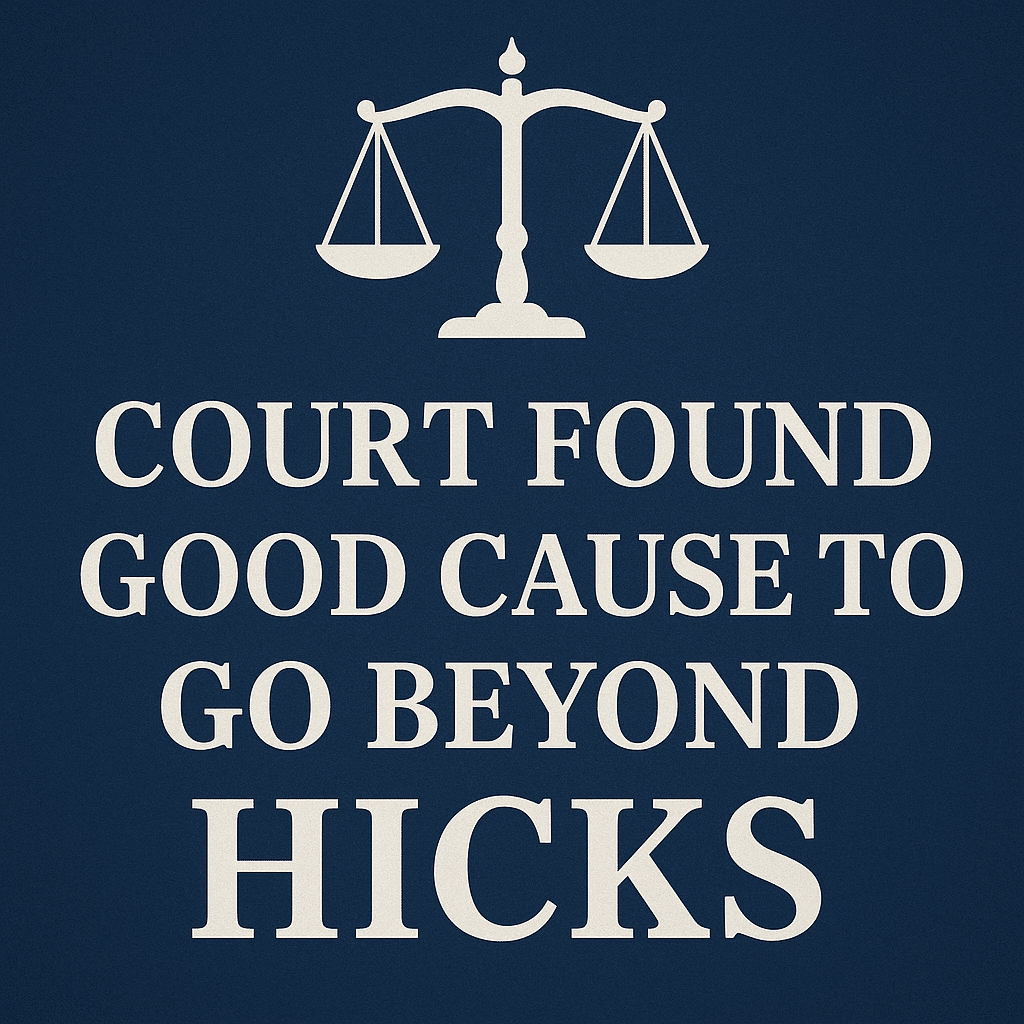
If you’re facing criminal charges in Maryland, you may hear the phrase: “The court found good cause to go beyond Hicks.” Understanding this phrase is crucial as it directly relates to your rights and the legal proceedings you may encounter. This article will explore the implications of good cause to go beyond Hicks, the factors influencing such decisions, and how it can impact your case’s outcome.
Understanding the Hicks Rule in Maryland
The Hicks rule originates from the landmark 1979 Maryland case State v. Hicks. This case established critical principles related to the timing of trials in Maryland and is now embedded in Maryland Rule 4-271 and Criminal Procedure § 6-103. According to this rule, a defendant must be brought to trial within 180 days of their initial appearance with legal counsel or the formal entry of the defense counsel’s appearance—whichever occurs first. This stipulation aims to uphold the defendant’s right to a speedy trial, a fundamental protection designed to prevent prolonged detention and ensure timely resolution of criminal matters.
Delays in legal proceedings can have severe consequences, not only for the defendant but also for witnesses and victims involved in the case. The strict adherence to the Hicks rule reflects Maryland’s commitment to a fair judicial process, ensuring that justice is served without undue delay. A speedy trial is not just about moving the case forward; it’s about protecting the integrity of the legal system and the rights of the individuals within it.
When Can the Court Go Beyond Hicks?
In situations where delays occur, only a county administrative judge or their designated representative has the authority to postpone a trial beyond the 180-day Hicks deadline. However, such a postponement is only permissible if the court finds good cause to go beyond Hicks—a determination that must be explicitly documented in the court record. This ensures transparency and accountability in the judicial process, allowing for scrutiny of the reasons behind any delays.
Common scenarios where courts may find good cause to extend the deadline include unforeseen circumstances that hinder the prosecution or defense from proceeding as planned. This may involve instances such as natural disasters, significant changes in the law affecting the case, or other extraordinary events that could not have been anticipated. Each case is unique, and the determination of good cause varies based on the specific circumstances at hand..
What Is “Good Cause” Under Hicks?
“Good cause” isn’t specifically defined in the law, but Maryland courts generally accept the following reasons:
- A key witness is unexpectedly unavailable
- The defendant or attorney is seriously ill
- There are scheduling conflicts that cannot be reasonably avoided
- New evidence or plea negotiations arise shortly before trial
On the other hand, matters that typically do not constitute good cause include routine issues such as simple court congestion, a prosecutor’s lack of preparation, or cases where the defense fails to provide sufficient justification for delays. Recognizing these limitations can help both defendants and their attorneys navigate the complexities of the legal system.
This decision can profoundly influence defense strategies. A skilled Southern Maryland criminal lawyer will meticulously analyze the reasons behind any delays and challenge any unjustified continuances. This strategic examination not only protects the defendant’s rights but also helps to ensure that the pursuit of justice remains equitable and fair.
Why It Matters If the Court Found Good Cause to Go Beyond Hicks
The implications of the court’s decision on good cause are significant. If the court does not find good cause and the 180-day limit is breached, the case could potentially be dismissed—a considerable victory for the defense that emphasizes the importance of adhering to procedural rules. Conversely, when the court finds good cause to go beyond Hicks, the case may proceed legally, even after the stipulated deadline has passed. This can lead to extended periods of uncertainty for defendants, victims, and witnesses involved.
At Southern Maryland Criminal Defense, we are committed to fighting for your rights and ensuring that you receive a fair trial. Our team understands the intricacies of the Maryland legal system and is dedicated to protecting your constitutional rights, including the right to a timely trial. If you are facing criminal charges and require immediate assistance, schedule a free consultation today. Our experienced lawyers are ready to advocate on your behalf and provide the support you need during this challenging time.
How a Criminal Defense Attorney Can Help
If your case involves delays and the court found good cause to go beyond Hicks, it’s critical not to assume that everything was handled appropriately. An experienced attorney can thoroughly review the record to ascertain if the postponement was lawful or if any violations of your right to a speedy trial occurred. Legal representation is vital in these situations, as it can mean the difference between a successful defense and prolonged legal battles.
At Southern Maryland Criminal Defense, we fight to protect your constitutional rights — including the right to a timely trial. If you’re facing criminal charges and need answers fast, schedule a free consultation today.
